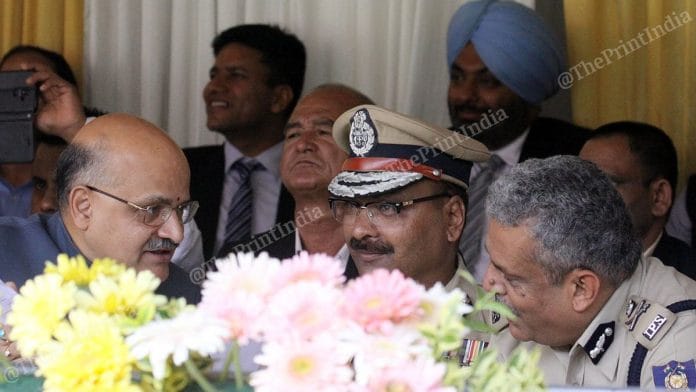New Delhi: With just days left before the controversial legislation bifurcating the state of Jammu and Kashmir into two union territories comes into effect, the IAS, IPS and IFS officers from the state are gripped by a sense of apprehension, confusion and anticipation for what awaits them.
According to the Jammu and Kashmir Reorganisation Act, the officers already serving in the J&K cadre would continue serving in the existing cadre. In future, however, officers of the All India Services meant to serve in Kashmir will be recruited into the AGMUT (Arunachal Pradesh-Goa-Mizoram-Union Territory (AGMUT) cadre.
Serving officers, however, remain unsure of how this provision of the Act would actually be implemented.
While the Modi government had on 5 August revoked the state’s special status under Article 370, it proposed that the state would actually be bifurcated into the Union Territories of Jammu-Kashmir and Ladakh from the night of 31 October.
“The Prime Minister and Home Minister have on record said the UT status of Kashmir is a temporary provision… Then what sense does it make to permanently merge the J&K cadre with the UT cadre?” asked a senior J&K cadre IAS officer, who is currently on central deputation.
“Obviously with all these contradictory messages, there is confusion across the cadre.”
Officers from the state seem unsure of whether they will be posted to other parts of the country or if it is only the fresh recruits who will be eligible for outside postings.
“Right now, there is some degree of uncertainty over whether we would be eligible for postings in other places or not,” said a 1997-batch IPS officer of the J&K cadre.
“The seniors in the service are not too keen to be sent out because they feel that they have served in Kashmir throughout their careers, and would have to start from scratch if they go somewhere else. The mid-level officers see it as an opportunity to blend in with the rest of the country.”
However, other officers who spoke to ThePrint on condition of anonymity said that the Act makes it amply clear that the existing officers will continue to serve in J&K.
“The Act has made it very clear that existing officers would continue to serve in Kashmir, and the fresh recruits will be recruited into the UT cadre, and would be eligible to be posted anywhere,” an IAS officer said.
“But other officers of the AGMUT cadre would now be eligible to come to Kashmir, and serve here,” the officer said.
For the first time after Article 370 was revoked, the Modi government last month approved the appointment of an IPS officer from the AGMUT cadre to Jammu and Kashmir.
“This would help because when officers from the rest of the country come and serve in Kashmir, it would expedite the process of the integration of the region,” the officer said. “Additionally, it would address the huge deficit of IAS officers in the state.”
A shortage of officers
According to government data, while the sanctioned strength of IAS officers in Kashmir is 137, the actual strength is 70 officers.
“If the government decides to send more officers from the AGMUT cadre to J&K immediately, it would address the huge deficit,” the officer added.
Last month, representatives of the three All India Services met Chief Secretary B.V.R. Subrahmanyam to express some of their concerns as they await their merger with the AGMUT cadre.
“One of the big concerns among the officers was that AGMUT cadre officers would have no experience in dealing with the peculiarities of Jammu and Kashmir, and may not know how to handle sensitive situations,” said another IPS officer. “Especially at a time like this, it is felt that people familiar with the region and its people are kept in charge, and not outsiders.”
In addition, local administrative and police officers from the state of J&K are feeling a little anxious, said the IAS officer quoted above. “Due to Article 370, officers from the Kashmir Administrative Service would get promoted to the IAS in larger numbers… This will stop now, so they are anxious about their future.”
While in the rest of the country, the total number of IAS officers in a state consists of two-thirds of direct recruits, and one-third of promoted officers from the state service, in J&K, this ration was 50-50, the officer explained.
However, dismissing other concerns as “momentary,” the officer said, “At the end of it, we are the All India Service… The point of our job is that we can be posted in any part of the country, and should do it with the same zeal and enthusiasm.
“The IAS are supposed to be generalists… So we should be generalists in the true sense, and not want regional specialisation in Kashmir,” he added.







Not having its own cadre of IAS and IPS officers will be a loss for the state. Officers who, barring time spent on deputation, would have served in the state, learnt its language, understood the needs of the people amidst its special circumstances. When decisions are taken within a small group, amidst high secrecy – Demonetisation comes readily to mind – the profound long term consequences are not adequately thought through.